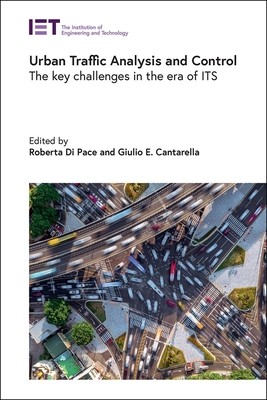
- We will send in 10–14 business days.
- Publisher: Institution of Engineering & Technology
- ISBN-10: 1839537167
- ISBN-13: 9781839537165
- Format: 15.6 x 23.4 x 2.5 cm, kieti viršeliai
- Language: English
- SAVE -10% with code: EXTRA
Urban Traffic Analysis and Control (e-book) (used book) | bookbook.eu
Reviews
Description
Urban Traffic Analysis and Control: The key challenges in the era of ITS explores fixed timing and variable timing strategies for urban traffic control. The former are typically applied off-line to support transportation planning or in simple cases when there is no need of adaptive control or on-line support to real-time traffic management. On-line applications require sensors for flow monitoring and within-day dynamic models for flow prediction, or simple data-driven methods. Both approaches are within the scope of the book.
The book addresses three main topics:
- The first is methods for estimating and predicting traffic flows, including traffic analytics, short term traffic flow prediction, real time demand estimation, and macroscopic traffic performance indicators based on floating car data. The book provides the theoretical background to traffic flow theory, as well as addressing the methods for traffic flow estimation and prediction.
- The second is traffic control methods, with a primary focus on algorithms and models for signal coordination.
- The third topic is the impact of emerging technologies on enhancing traffic signals and management.
This book is the first to present the theory for fixed and adaptive urban signal setting design at both the single junction and network levels. The most recent advances in intelligent transportation systems and the impact of connected and cooperative vehicles on traffic analysis and control are also considered. Finally, the main strategies aiming at optimising impacts, including safety, fuel consumption and emissions, are also included.
The book is intended to be a reference work for academic researchers and graduate students in the intelligent transportation field, as well as professionals and consultants working in this area.
EXTRA 10 % discount with code: EXTRA
The promotion ends in 23d.11:56:02
The discount code is valid when purchasing from 10 €. Discounts do not stack.
- Publisher: Institution of Engineering & Technology
- ISBN-10: 1839537167
- ISBN-13: 9781839537165
- Format: 15.6 x 23.4 x 2.5 cm, kieti viršeliai
- Language: English English
Urban Traffic Analysis and Control: The key challenges in the era of ITS explores fixed timing and variable timing strategies for urban traffic control. The former are typically applied off-line to support transportation planning or in simple cases when there is no need of adaptive control or on-line support to real-time traffic management. On-line applications require sensors for flow monitoring and within-day dynamic models for flow prediction, or simple data-driven methods. Both approaches are within the scope of the book.
The book addresses three main topics:
- The first is methods for estimating and predicting traffic flows, including traffic analytics, short term traffic flow prediction, real time demand estimation, and macroscopic traffic performance indicators based on floating car data. The book provides the theoretical background to traffic flow theory, as well as addressing the methods for traffic flow estimation and prediction.
- The second is traffic control methods, with a primary focus on algorithms and models for signal coordination.
- The third topic is the impact of emerging technologies on enhancing traffic signals and management.
This book is the first to present the theory for fixed and adaptive urban signal setting design at both the single junction and network levels. The most recent advances in intelligent transportation systems and the impact of connected and cooperative vehicles on traffic analysis and control are also considered. Finally, the main strategies aiming at optimising impacts, including safety, fuel consumption and emissions, are also included.
The book is intended to be a reference work for academic researchers and graduate students in the intelligent transportation field, as well as professionals and consultants working in this area.


Reviews